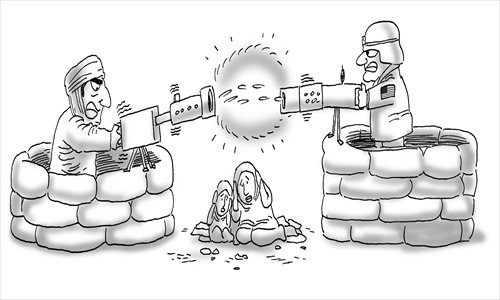Afghanistan needs support to stand on own

Illustration: Liu Rui/GT
Editor's Note:
With the US announcing it will extend its military presence in Afghanistan, the country is now remaining in the theater for the foreseeable future. How will the prolonged stay of US troops influence Afghanistan? Will US military forces finally leave the country? Global Times (GT) reporter Yu Jincui talked to Rangin Dadfar Spanta (Spanta), former national security advisor of Afghanistan, over these questions.
GT: US President Barack Obama just announced that the US will halt its military withdrawal from Afghanistan. How do you see this decision?
Spanta: The reality in Afghanistan is that we have some security difficulties. My view is to support Afghan security forces so that we can do our own job. We need support and cooperation from international forces, but the main task must be thrown on the Afghan forces.
GT: This is not the first time the US has revised its withdrawal plans. Is a total pullout of US troops in Afghanistan possible?
Spanta: This is a problem of the US foreign policy toward Afghanistan in next few years. It's better for Afghanistan to know what is the long-term strategy of the US, how long they will stay in Afghanistan and when they will leave Afghanistan.
This is important and that's what I hope to see. Changes of foreign policy regarding an ally can cause more misunderstandings. The US has to leave one day, and Afghanistan is a sovereign country. When our security requires us to stand on our own, this is the time they have to go, but I think cooperation for a limited time is necessary.
GT: The US recently bombed a hospital in Kunduz run by Doctors Without Borders. Given the prolonged stay of US troops in Afghanistan, how to better protect civilians?
Spanta: It's a very sad issue that we lost many of our civilians. Civilian casualties during US operations in Afghanistan in recent years have been one of the main difficulties and problems we have both now and when I was in the government. We have witnessed this problem many times and we have discussed this issue. They have to end this kind of operation which is not acceptable.
Giving the responsibility to Afghans, better training and equipping Afghan security forces, including the air forces, will resolve the problems, because we know where the centers of fighting are and where the civilian centers are. By the massive use of force, of course foreign troops can cause more casualties.
I think the right answer is absolute Afghanization of the security of Afghanistan. There is no other solution. Giving the task of Afghan security forces to foreign forces means that we need more years to be independent. We have to give it an end.
GT: Why is Afghanistan still turbulent?
Spanta: I think the international community made a mistake in the last 30 years. In the battlefield against terrorism, they caused two additional problems for countries like Afghanistan.
Military operations in the Middle East created a failing state, and provided the terrain for terrorist groups like the Islamic State. And because of the distraction of Iraq, we lost valuable time needed for building Afghanistan.
GT: With the recent surge of the Taliban, the security situation in Afghanistan is deteriorating. Is Chinese investment in the country safe?
Spanta: So far, Chinese investment is not impacted. The problem is the perception. If you have a perception of insecurity, the perception is very dangerous as it's not the reality and it takes time to change the perception. The Afghan government is making all possible efforts to protect Chinese companies, Chinese entities and Chinese people in Afghanistan. This is our commitment. I again invite more Chinese investment into Afghanistan because the situation in reality is much better.
GT: China and the US for the first time jointly hosted a high-level meeting on Afghanistan's reconstruction and development during the UN Assembly late last month. Does that mean China and the US will cooperate on the Afghan issue?
Spanta: Of course more cooperation between China and the US is required, but I want to underline in addition to that the importance of regional cooperation.
Because stability and peace in the region is our responsibility, the one of China, Pakistan, India, Iran and all the regional players. We can enhance collaboration for peace and stability, and in this regard my own expectation is for a stronger engagement from the Chinese side.